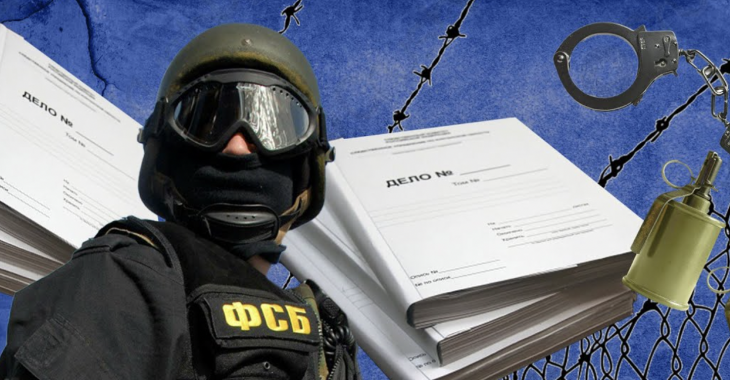Russia plans life sentences for charges used against Ukrainian political prisoners and opponents of its war in Ukraine

The number of political prisoners in Russia and occupied Crimea has long been shockingly high, but may soon become an even larger percentage of all those serving sentences Hundreds, if not thousands, of prisoners serving huge terms for murder and other violent crimes have already been released to fight in Ukraine. Now new legislation proposes to waive criminal liability for many other crimes if men agree to go and fight in Ukraine. In the meantime, amendments have either already come into law or have been tabled in the State Duma which will seriously increase sentences very often used against Russian and Ukrainian political prisoners.
On 7 April, Vasily Piskarev, head of the State Duma committee on security and fighting corruption, reported that he and others from the committee had drawn up and tabled amendments to Russia’s criminal code significantly increasing sentences for what he terms ‘state treason’ and ‘terrorism’. Piskarev says that the amendments are supported by all factions in the Duma, and have been prepared for a draft bill already passed in its first reading. This trick is in breach of procedural regulations, but has already been used several times since 24 February 2022 to rush through repressive legislation.
The amendments propose an increase in the possible sentence for a so-called terrorist act, under Article 205 § 1) from 15 to 20 years. The minimum sentence for something entitled ‘assisting terrorist activities’ (under Article 205.1 § 1) will increase from five to seven years, while the minimum for “being an accessory” (Article 205.1 § 3) will rise from 10 to 12 years, with the maximum sentence – 20 years. For ‘organizing a terrorist society and participation in it’ (Article 205.4 ), the sentence will be from 10 to 15 years (as opposed to the current 5 to 10 years).
For what is called ‘an act of international terrorism’ (Article 361), the minimum sentence will increase from 10 to 12 years, while ‘state treason’ will carry a life sentence. This follows the introduction, signed into law on 29 December 2022 by Russian president Vladimir Putin, of life imprisonment for ‘saboteur activities.’
All of the above crimes are grave and, in principle, carry severe sentences in any country. The difference lies in their application, with such charges increasingly used for political reprisals in Russia and occupied parts of Ukraine.
‘State treason’
Russian politician and journalist Vladimir Kara-Murza has been imprisoned in Russia since April 2022, and is facing an incredible 25-year sentence on charges of ‘circulating fake information about the Russian armed forces’ (Article 207.3) over a speech in the USA condemning Russia’s war against Ukraine and on mystery ‘state treason’ charges, laid six months after he was remanded in custody.
Several Ukrainians have been arrested in occupied Crimea and accused of ‘state treason through spying’. Russia uses the fact that it is near impossible to live in occupied Crimea without Russian citizenship to then accuse Ukrainians of ‘treason’. Although all ‘spying’ charges are heard behind closed doors and with even the defendants’ lawyers forced to sign non-disclosure undertakings, there is every reason to believe that the appalling sentences passed against Ivan Yatskin (11 years) and Halyna Dovhopola (12 years), as well as others, are on fabricated charges, probably laid because of their pro-Ukrainian position.
‘Sabotage’
Russia arrested Nariman Dzhelyal, the world-renowned Crimean Tatar Mejlis leader, human rights defender and journalist, in September 2021, just two weeks after he had taken part in the international initiative meeting of the Crimea Platform. The entire ‘sabotage’ charges against him, civic journalist Asan Akhtemov and his cousin, Aziz Akhtemov, received international condemnation and were based entirely on ‘confessions’ extracted through torture and later retracted, and the ‘testimony’ of secret witnesses.
‘Acts of international terrorism’
Since its full-scale invasion of Ukraine, Russian military and FSB have abducted a large number of Ukrainians and charged them with so-called ‘acts of international terrorism’. The country which illegally invaded Ukrainian territory and is committing acts of terror throughout Ukraine claims that Ukrainian citizens who opposed their invasion are guilty of ‘international terrorism’. Men and women have been abducted, tortured and are now facing ‘trials’ of quite staggering lawlessness.
See:
Russia begins grotesque show trial of abducted Ukrainian war veteran
‘Terrorism’ without any crime
The new amendments do not propose changes to Article 205.5 (organization or participation in the activities of an organization labelled ‘terrorist’) which Russia has used to imprison over 100 Crimean Tatar and other Ukrainian Muslims in occupied Crimea. This is presumably because the charges already carry a possible life sentence and are, at present resulting in sentences of up to 20 years’ imprisonment. There are absolutely no grounds for ‘terrorism’ (or any other) charges, and have been internationally condemned as obvious reprisals against civic activists and journalists.





